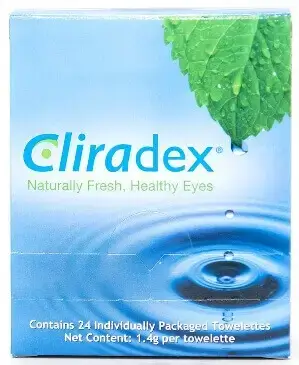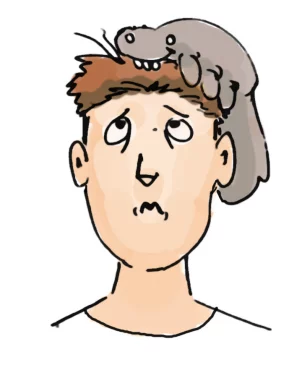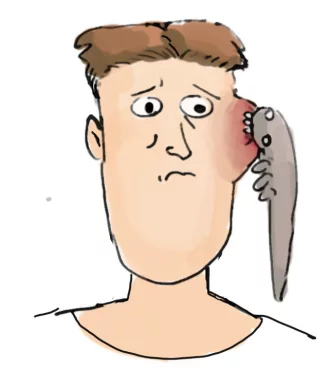
Over the years I have read a few hair loss forum threads linking the demodex mite to hair loss. The oldest such thread with a decent number of comments that I could find was from 2005 on the hairlosshelp forums, which no longer exist. I have never believed that demodex mites could be a cause of hair loss, although I admittedly also never did much research on the subject.
Of the dozens of Demodex species that have been discovered to date, only Demodex brevis and Demodex folliculorum are found on humans. People have tried various top rated dandruff shampoos to kill these mites with limited success. Some have seen success via the use of tea tree oil.
Demodex Symptoms
At the back of my mind, I thought that at some point during a slow news month, I would write a post on the subject. I was pretty sure that my conclusion would be that while demodex does not cause hair loss, it might be causing or exacerbating dandruff, itchiness, dryness or oiliness of the scalp. Many people with Demodex do not get any major side effects. However, among the most commonly reported Demodex symptoms include:
- Itchy skin on face and/or hair.
- Scaly skin.
- Rough skin that feels like sandpaper.
- Sensitive skin.
- Redness.
- Rash.
- Eye irritation and eyelid thickening.
- Eczema and Rosacea like symptoms.
Demodex, Hair Loss and Cliradex

However, as with so many other surprising developments from the past several years when it comes to sudden support for treatments that at first impression seem ludicrous (e.g., mechanotherapy, injection of fat cells, wounding, artery ligation and even scalp burning), I got a very surprising e-mail several weeks ago (pasted below) from Mr. Paul Salsberg of Cliradex that might imply yet another avenue to combat hair loss via treatment of Demodex.
E-mail from Paul Salsberg discussing how to get rid of Demodex using Cliradex (he is also posting in the comments to this post):
OK, let me begin by stating that sometimes the “obvious” craziness turns out to be a genuine discovery. There have been hundreds if not thousands of theories regarding MPB from legitimate scientists. Most believe they completely understand MPB but I believe differently based on the scientific information I have regarding the ocular region of the head.
My name is Paul Salsberg and I have been in the eyecare business now for over 15 years. Over the past 4 years, I have been distributing a product called Cliradex in Canada (www.cliradex.com). It is considered a “cosmetic product” but in reality it is the most effective treatment of Demodex mites (around the eye — also for blepharitis). What’s unique about Cliradex is that unlike tea tree oil (TTO), this has 4-Terpineol which has several times the potency of TTO without the excessive stinging or burning sensation. I’ve seen it kill bacteria, fungus and of course, demodex mites.
Every human has demodex but some have a lot. I have studied the demodex mite now for years and I believe that the reason why individuals eye lashes fall out is due to the fact that demodex’s main food source is right on and in the hair/lash follicle duct. They’re not only consuming the excessive oil but also the root of the follicle.
Simply put, the reason why MPB is a genetic trait is not necessarily because hair follicles are programmed to fall out at a certain age. I believe its because the body produces excessive sebum at a certain age and hence the mites find the “food” and start reproducing at such rapid rates. Its a feeding frenzy in that particular area of the male body.
Its important to note, although everyone has demodex, they are concentrated in a much larger area where there is (a) hormones, (b) sebum and (c) dead skin. My hypothesis is that most MPB victims have excessively oily scalps in the designated areas. I’m sure you have looked into tea tree shampoo or Nizoral to treat fungus and perhaps slow down the advancement of MPB. These shampoos are somewhat effective but I believe the reason why they are not holy grail is because the demodex mites are still alive throughout the scalp. I believe that Cliradex may not only reduce the sebum but will also destroy the life-cycle of demodex (6 weeks). Basically, the individual’s hair follicle will be in a much healthier state than ever before. I have proof that its the most effective method to actually eradicate the mite. As a result, eyelashes look and actually become healthier.
So you are probably asking, why am I reaching out to you? I am doing so because Cliradex is producing a new foam designed for the ocular area but can be used anywhere on the body including the scalp. I believe that if individuals who are experiencing the first signs of MPB start using this foam, it can potentially limit or reverse the hair loss. After seeing the results around the eye, I am quite optimistic this may work well for those in the initial stages of MPB — including the temple region.
I was wondering if I can speak with you more about this as I believe you are very knowledgeable in the field. I really have nothing to gain as I do not own Cliradex as I am a small distributor in Canada. However, if you think my theory it has some merit, perhaps you can reach out to your user base to find out if they would like to try it for 3-6 months for free. I am looking for about 10-15 volunteers.
Thoughts?
Regards,
Paul Salsberg, President
Bright Optical Inc.
(877) 870-0105 ext: 707
When I first read the e-mail, I immediately felt that Paul was genuine. Besides his e-mail sounding like he knows what he is talking about (at least when it comes to the ocular region and eyelashes), he is offering free treatment for up to 15 volunteers. Note that Cliradex is currently fairly expensive (24 towelettes on Amazon cost around $40), but I hope the new foam when it comes out is cheaper. There is also a Cliradex light version for sale at retail pharmacy stores such as CVS and Walmart nowadays.

I should also note that Demodex mites have been implicated in facial skin conditions ranging from rosacea to dermatitis to blepharitis. However, you can also find studies that suggest a weak correlation between the mites and facial skin problems. Note that the condition that affect humans as well as canines is called Demodicosis. It can affect the eyelashes area, face and scalp. Another name for this condition is demodectic mange. Demodex is not contagious.
It seems like Cliradex is a very safe product. In fact Paul sent me a large sample and I have been using the towelettes around my nose for the past few days to see if they are effective in reducing my mild seborrheic dermatitis.
When it does come out, I would be happy to try the foam in place of the effective Nizoral for my on and off scalp dandruff and itching problems. A tea tree oil (4-Terpineol, to be precise) based product such as Cliradex is always preferable to a Ketaconozale based product such as Nizoral if both have the same efficacy.
Do I think that Cliradex will grow back hair that has been lost for a few years? No way. Do I think that this product can substantially improve overall scalp condition? Yes. Perhaps good scalp health can make medications such as Finasteride and Minoxidil work better, although I am not totally convinced about that as yet. Perhaps better scalp health may offer a stronger deterrence to the ravages of DHT and delay balding for a short time?
Stranger findings have been witnessed in recent years, and I am not going to totally reject such theories and correlations any more. At the very least, better scalp health would be very much appreciated by the 100s of millions of balding men and women around the world who often have to deal with the double whammy of excess itching/flakiness/ inflammation combined with hair loss.
Note: Mr. Salsberg has not offered me any kind of commission or financial incentive to promote or discuss Cliradex.
Update: